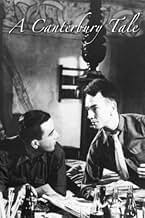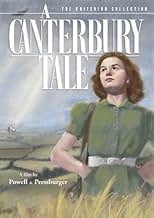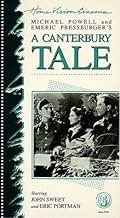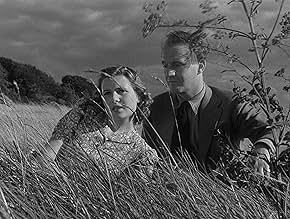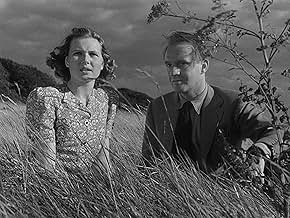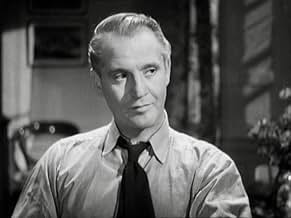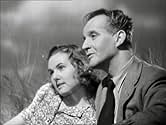Ajouter une intrigue dans votre langueThree modern-day pilgrims investigate a bizarre crime in a small town while on their way to Canterbury.Three modern-day pilgrims investigate a bizarre crime in a small town while on their way to Canterbury.Three modern-day pilgrims investigate a bizarre crime in a small town while on their way to Canterbury.
- Directors
- Writers
- Stars
- Sergeant Bob Johnson
- (as Sergt. John Sweet U.S. Army)
- Sergt. Bassett
- (as Antony Holles)
Avis en vedette
The photography is geared towards presenting the glory of the English countryside, and beautifully conveys an England which was fast disappearing by the time war broke out. Watch especially for the shots of Alison on the downs just after looking towards Canterbury. Gorgeous!
You will either love or hate this film, but you MUST see it if you have not already done so. I've just bought it on DVD, and am ditching various copies taped from TV over the years.
PS: If anyone with any influence at Carlton reads this, please urgently consider transcribing "I Know Where I'm Going" - another fine Powell/Pressburger movie - onto DVD.
Alison (Sheila Sim) is a London shop girl who ventures to the English countryside to work on a farm as a "land girl" and to revisit the spot where she vacationed with her now dead soldier boyfriend. Bob (John Sweet) is a naive American GI who's girlfriend back in Oregon has stopped writing to him. He told his mother he'd visit Canterbury. Peter (Dennis Price) is a disillusioned organist whose career has been limited to playing in movie theaters and who is soon to ship out overseas.
The three disembark a train together and venture toward the great cathedral city when Alison is attacked in the dark by a strange offender known locally as the "glue man." He's poured nasty glue all over her head. As the three find lodgings and talk to locals they learn that the glue man has struck many other times.
Alison settles into her farm job while Bob discovers the countryside still (in 1944) very much tied to 19th-century ways. Peter tries to find out more about the glue man. They all meet a local eccentric (Eric Portman) who may be the glue man. He lectures locally on the rewards of country life and works as a magistrate in Canterbury. They all meet at the cathedral as they meet their fates.
Absolutely gorgeous B&W photography lovingly displays the beautiful countryside with ample shots of wide sky and billowing fields, rustic farms and buildings, and always Canterbury in the background.
The simple story lines are set against the complex allegory of a journey of discovery. Each of the pilgrims finds something in Canterbury, but what happens to them afterwards is left to our imagination. Both Alison and Bob find answers to their private sorrows, and Peter attains a cherished dream. All three are changed in deep and moving ways.
John Sweet was an amateur actor stationed with the US Army in England when he was discovered for this role. His plainspoken American is both naive and deeply wise. His growing love of the countryside and the old ways is infectious. Sheila Sim plays a sturdy and practical girl who deals with her loss while loving her new life in the country. Dennis Price plays the most complicated character, since his loss is more a loss of ambition and opportunity than a loss of human love. His discovery at the cathedral is very moving. Portman is a lonely and aging man who may be attracted to Alison as a kindred spirit, but all paths do not lead to the same destination.
Many notable actors in small parts include Edward Rigby, Charles Hawtrey, Hay Petrie, Freda Jackson, Esma Cannon, Graham Moffatt, Eliot Makeham, Esmond Knight, and Judith Furse.
Powell and Pressburger scored a major success with this moving and seemingly simple story. But the characters will stay with you long after watching this glorious masterpiece.
The scope of the movie is amazing, and in 2 hours it covers enormous ground. The entire thing is so skillfully and assuredly done that in spite of the absence of any stars and (almost) of a story, and the fact that John Bull is never my companion of choice in any desert island, I was riveted to this movie. Besides the acting, this effect was achieved also by Alfred Junge's brilliant art direction (I couldn't believe the Canterbury church was just a set) and William Hillier's black and white photography. Two scenes stand out - a bird 'turning into' an airplane signifying time going on ahead by a few centuries, and an armoured car breaking through bushes and undergrowth (a very 'Predator'-ish shot).
This is a must see.
Too many of today's critics obsess about the "Lesbian" farm woman whose character, in the 1940's, would have been ordinary and been regarded as being ordinary: a woman raised under the sterner discipline and mores of her day, with no-nonsense, no-b.s. values of virtue, obligation and hard work - and of getting to the point. It's postmodernists' affectation to automatically suspect doughty, matter-of-fact women characters - any eccentric women characters whom their postmodernist Miss Jean Brodie nonsense has bent them to suspect of fitting their screwy postmodernist (i.e., most often Marxisant, but often also Romantic) worldview - in earlier films of being "Lesbians." This woman is, consummately, a farmer who has to consider pragmatically what all farmers have always had to consider: how to smartly, efficiently work their land to its top yield against time and weather, pests and parasites, poachers and market conditions; there's nothing "Lesbian" about any of her singleminded agrarian pragmatism, or about her unremarkable - for her day - country ladies' sartorial choice, or even about her puffing a cigarette.
'A Canterbury Tale' isn't among the best of Powell & Pressburger's efforts; but it doesn't fall far short of their best. In a spot or two the plot plods, but then plodding was the pace of the Kentish countryside, so I think that it's only to our early third millennium sensibilities that it seems to plod. Seldom has black & white cinematography managed, as it manages here, to communicate through chiaroscuro the pilgrims' unease, and through the blessed splendor of sunlit, cloud-garlanded vistas of the Weald of Kent their respite.
As the Glueman strives to communicate the pace, sensibilities, and sensations of Chaucer's pilgrim's time, so too must we latter-day viewers accommodate our viewing of this film to the pace, sensibilities, and sensations of its period and setting: once we've done that - which demands of us no extraordinary effort - the legendary, enduring Powell & Pressburger magic works its spell.
From the outset I found Sergeant Sweet's unaffected acting well-suited to the storytelling. The Yanks whom Wartime Britons recall were probably more like Mike Roczinsky, yet among those "overpaid, overfed, oversexed, and over here" American "invaders," among all those "brown jobs," were young men quite like Sweet's Bob Johnson. Dennis Price's manner is a bit too aristocratic for his portrayal of a sergeant, but on the whole Price's thespian gifts help him to carry off his role very well. Sheila Sim gives a perfectly iconic portrayal of a young woman of her time: bereaved but not crushed; proud yet considerate; tender yet not mawkish; vulnerable yet capable. Eric Portman's Glueman is appropriately mysterious and mildly menacing and yet, in the ending we discover that he's all along been a benign agent of illumination, the neutral but never indifferent catalyst, the benevolent spur to the young people's sleuthing to know their present through their coming to touch their collective past; the Glueman is, if you think about his role in the narrative, rather God-like - or, if your prefer, rather Nature-like.
What's lovely about the dénouement here is that it enchants without indulging in sodden kitschiness, and indeed that it enchants in spite of of its scant kitschy elements. In the end the Glueman vanishes from the pilgrim's and our ken because he's accomplished his task of cluing and gluing the pilgrims to their past, to the mystical dimension of Being in their Own Time as that Being can only have come about by dint of their having touched their Past in their Present, which is the predicate of their harboring good hope for their Future. This message, to people whom wartime exigencies shifted brusquely about en masse as people had hitherto never shifted about, may have rung in 'A Canterbury Tale's' contemporary audiences a chord of sentimental longing and welcome reassurance.
This is a thoroughly English film best appreciated when one knows that Powell grew up in rural Kent and that he loved his home county's loveliness as only a native can and does love eternally his childhood home - and the verities it imparts early to him. In our present age of rapidly successive, plug-in and plug-out residential and professional transience - the first age of nigh-universal human rootlessness - 'A Canterbury Tale's' blessing is its acquainting us with our 1940's forebears' more permanent, more grounded sense of themselves and their place in the world and in time, a sense which they felt the war had put under threat and had hurled them and their world, willy-nilly, into unsettling uncertainty. It seems unlikely that we - our species - shall ever again know the quiet certainties, tranquility, and satisfaction of lifelong residence in, or near, our birthplaces. Until our time urgency meant for people something quite different from what urgency means for us. If people before our hyper-active, attention-deficited, more artificial time were not more "authentic," then they were certainly far less remote than we've become from Nature's cycles and temper.
'A Canterbury Tale's' charm is quiet, subtle, and in the end it's sensual, mystical, illuminating, and eternally dear. Pity that few have nowadays the time or the temper for such charm.
The only word I can find to give a flavour of this story is that it is above all English - as English as Ealing comedy (without the comedy), as Miss Marple (without the murder), as Elizabeth Goudge (without the magic)... and yet again I find myself defining it by what it *isn't*! It's English in a way that is quietly, deeply antithetical to the frenetic posturing of 'Cool Britannia'. It is as English as the haze over the long grass beneath the trees of a summer meadow; as polished brass and a whiff of steam as the express pulls up at a country halt; as church bells drifting in snatches on a lazy breeze, and the taste of blackberries in the sun.
It's almost impossible now to comprehend that the 1940s countryside in which this film is set was *really there*; that it was not the Second World War but its crippling aftermath that industrialised farms, banished the horse-drawn vehicles from the wheelwright's, and exchanged towering hay-wains for silage towers. Britain was determined never to starve again - and so the world that had once differed so little from that of Chaucer's time was swept away beyond recall. When it was made, this film was no more a rustic period piece than 'Passport to Pimlico', a few years later, was an urban social documentary. Subsequent events have preserved both in mute evidence of contemporary communities that are almost unbelievable today.
It is perhaps fair, therefore, to assume that the type of viewer who will watch 'Battlefield Earth' is unlikely to find this film anything other than silly, parochial and ultimately dull! Very little actually happens. The story is on occasion both humorous and poignant, but what we at first assume to be the central plot turns out not to be the point at all. The triple denouement is set up so gently and skilfully that we, too, are taken by miraculous surprise, with the true shape of the film only evident in retrospect.
It is, ultimately, a story about faith, and miracles, and pilgrimages, even in the then-modern world of shopgirls, lumbermen and cinema organists - and if that idea in itself sounds enough to put you off, as I confess it would have done for me before I watched it myself, then I will gladly add that it is a film about beauty, and hope, and unexpected friendship and laughter; and technically very accomplished to boot. The use of black and white is glorious, ranging from the glimmer in the obscurest of shadows to sun-drenched hillside, and the totally unselfconscious reference to Chaucer in the opening sequence is in these days worth the price of admission alone.
If you like gentle films - sweet-natured films - films with a deep affection for their subject - films that make you laugh and cry, but always smile - then I urge you not on any account to miss this one. If, for the moment, you require thrills, spills, forbidden passions and last-minute rescues, then pass it by and let it go on its tranquil way. When you are old and grey and full of sleep, this unassuming classic will still be there, waiting...
Le saviez-vous
- AnecdotesThe Archers (Michael Powell and Emeric Pressburger's production company) weren't given permission to film inside Canterbury Cathedral. In any case, the stained-glass windows had been taken out because of the air raids, the aisles were filled with sandbags and earth to fight fires and to provide a soft landing for any masonry or sculptures that fell there. So the interior of the Cathedral was rebuilt in Denham Studio. They recreated it so well that Cathedral guides have been heard telling people that the film was shot in there.
- GaffesA camera operator's shadow is clearly visible while Alison is riding a horse and buggy along the pilgrim's road.
- Citations
Thomas Colpeper, JP: Well, there are more ways than one of getting close to your ancestors. Follow the old road, and as you walk, think of them and of the old England. They climbed Chillingbourne Hill, just as you. They sweated and paused for breath just as you did today. And when you see the bluebells in the spring and the wild thyme, and the broom and the heather, you're only seeing what their eyes saw. You ford the same rivers. The same birds are singing. When you lie flat on your back and rest, and watch the clouds sailing, as I often do, you're so close to those other people, that you can hear the thrumming of the hoofs of their horses, and the sound of the wheels on the road, and their laughter and talk, and the music of the instruments they carried. And when I turn the bend in the road, where they too saw the towers of Canterbury, I feel I've only to turn my head, to see them on the road behind me.
- Autres versionsThe original UK version runs 124 minutes. For the USA release, the film was re-edited to 95-minutes and new footage starring Kim Hunter inserted:
- A scene between Bob (John Sweet) and his new bride Kim Hunter on the Rockefeller Center introduces the story which he then tells in flashback.
- The idyllic scenes with the boys' river battle and much of the hunt for the glue-man is cut with addition scenes or commentary by Bob added to cover the gaps.
- There is an additional epilogue with Bob and his girl at the tea-rooms in Canterbury.
- ConnexionsFeatured in Arena: A Pretty British Affair (1981)
- Bandes originalesAngelus ad Virginem
(uncredited)
Traditional
Heard as a peal of bells in the opening titles
Meilleurs choix
- How long is A Canterbury Tale?Propulsé par Alexa
Détails
- Date de sortie
- Pays d’origine
- Langue
- Aussi connu sous le nom de
- Un cuento de Canterbury
- Lieux de tournage
- Selling, Kent, Angleterre, Royaume-Uni(Railway station and signal box)
- sociétés de production
- Consultez plus de crédits d'entreprise sur IMDbPro
Box-office
- Budget
- 650 000 $ US (estimation)
- Brut – à l'échelle mondiale
- 15 $ US
- Durée
- 2h 4m(124 min)
- Couleur
- Rapport de forme
- 1.37 : 1


